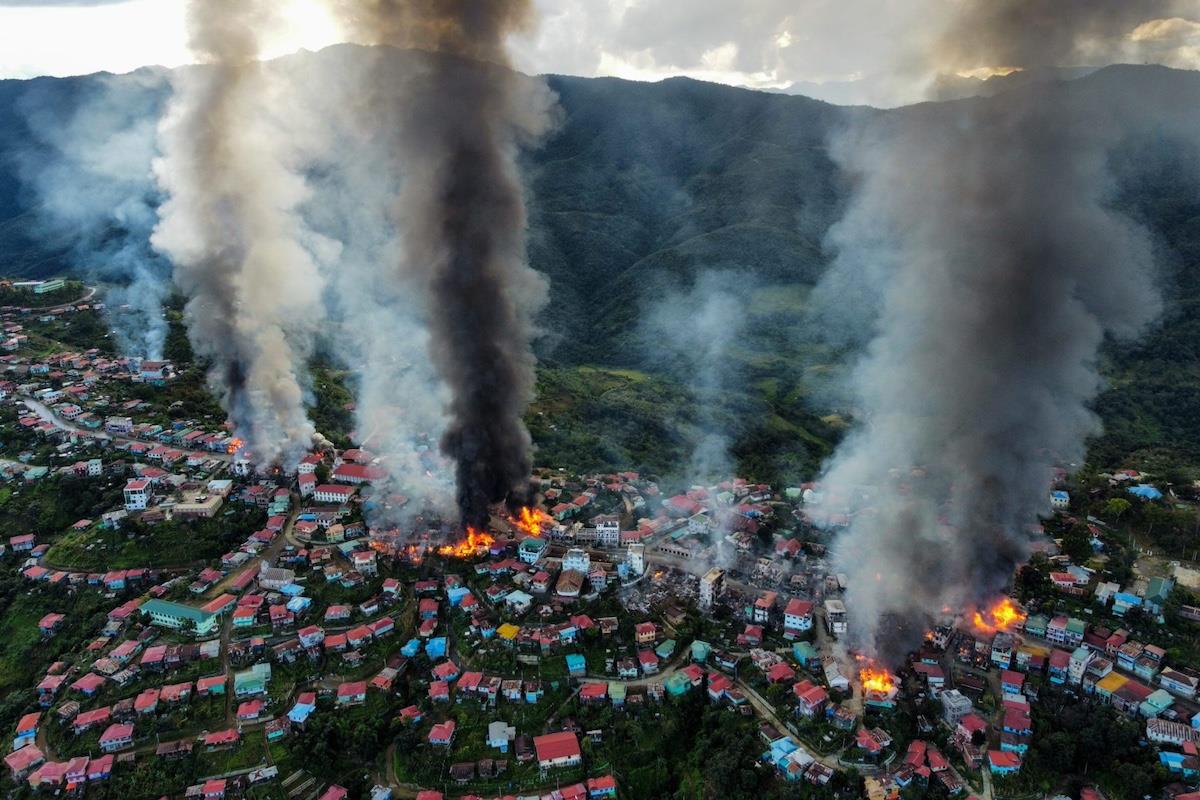Palestine, Myanmar On Parallel Paths Of Forever Wars
Both date back to the 1940s at the end of the colonial era, making them among the world's longest-running conflicts; both involve protracted disputes over land and sovereignty, and have resulted in decades of death and displacement.
In both cases, the dominant political formations, the state of Israel and the Union of Myanmar, insist there can be no division of territory into different states and have used escalating levels of military force to prevent this from happening, including the indiscriminate killing of civilians.
What is more alarming has been the failure of the international community and regional neighbors to have the slightest impact on managing or resolving either of the conflicts.
In the Middle East, a peace process with international backing was launched after the 1967 Arab-Israeli War. There were some significant achievements: peace agreements with Israel's neighbors, Egypt and Jordan, and the Oslo Process, a roadmap towards Palestinian statehood alongside Israel known as the two-state solution that was derailed after the assassination of a pro-peace Israeli prime minister in 1995.
The October 7, 2023, attacks on Israel carried out by the militant Islamic Palestinian faction Hamas further emasculated peace efforts. More than 1,200 Israelis were killed in the attack and more than 65,000 Palestinians have been killed during Israel's retaliatory war against the Hamas stronghold in Gaza.
Since then, Israel's opposition to Palestinian statehood and a resolution of the conflict has hardened to the point that today the Israeli government's line is that there will never be a Palestinian state.
Latest stories
China's Middle Corridor push puts Europe in the slow lane

US drone swarm plan spiraling into obilivion

Trump's pharma tariffs will make the world a sicker place
In Myanmar, there was little the international community could do to work toward resolving the conflict, which today affects western, northern and eastern regions of the country, during prolonged periods of military rule since 1962. There was a sudden surge of international interest and involvement after the military eased its grip on power in 2011, but little was actually achieved.
A military coup in February 2021 saw the conflict escalate and displace, by some credible estimates, more than 3 million people. At least 80,000 people have been killed since the intensification in hostilities. Despite appointing a bevy of envoys, both regional and international efforts have failed to reduce violence or bring anyone to the negotiating table.
What unites these two conflicts, therefore, is their longevity, relentless loss of life and the failure to resolve them.
There are key differences: Israel receives unconditional support from its biggest supplier of arms and aid, the United States. China is Myanmar's most important neighbor but has not always supported the central authorities or the Myanmar army, with which it battled via communist guerrilla proxies during the Cold War.
Myanmar's civil war pits dozens of ethnic armed groups against the army, yet the land they are fighting over is not considered under occupation by the Myanmar army in the eyes of international law. Most of the armed groups are demanding enhanced autonomy within a genuinely federal union, rather than independent statehood.
Gaza and the West Bank, where most Palestinians live, are both controlled by Israel and are, according to international law and UN resolutions, under occupation. Most of this occupied territory, including East Jerusalem, would form the basis of a Palestinian independent state.
What lessons can be learned? Perhaps the most important one is that strong assertions of sovereignty backed by military force are hard to combat. Firstly, because, as the saying goes, possession is 9/10ths of the law.
For all the celebration of self-determination as an aspiration, sovereignty is a core principle of statehood, which few states are willing to challenge, even in the face of palpable injustice and human suffering. As a result, there are limits to what the international community can do to impose what seem like just and reasonable solutions.
Second, threats to sovereignty make for strong leaders and hard states. In both Israel and Myanmar, the legitimacy of leadership rests on defending boundaries and preventing the loss of territory. Even the democratically elected Aung San Suu Kyi, an icon of non-violent democratic struggle in Myanmar and globally, was immovably firm on this principle.
In Israel, Prime Minister Benjamin Netanyahu has used the threat to Israel's security posed by Palestinians resorting to ever more violent bids for statehood to avoid being tried for corruption and undermined democratic institutions that could check his power. It is no coincidence, therefore, that there are limits to democracy in both countries.
Finally, both the Myanmar and Palestine protracted conflicts have a far-reaching impact on their region's security. Endemic lawlessness and the absence of governance in many areas of Myanmar under the control of ethnic armed groups has long fuelled trade in narcotics and more recently the establishment of scam centers run by transnational criminal syndicates that have bilked untold billions from ordinary citizens in the region and beyond.
The impact of the Israel-Palestine conflict is far greater. There have been three wars involving Arab States in 1948, 1967 and 1973, followed by countless acts of terrorism and sabotage conducted by extremist groups and intelligence services in the name of either Israel or Palestine.

Sign up for one of our free newsletters
-
The Daily Report
Start your day right with Asia Times' top stories
AT Weekly Report
A weekly roundup of Asia Times' most-read stories
The Israeli government has repeatedly stirred up anti-Islamic sentiment, suggesting its actions in Gaza today are protecting Europe and the West from Islamic extremism. This, in turn, fuels right-wing ethno-nationalism in Europe and the US.
Is there a way to end these forever wars? The diplomatic tools of conflict resolution based on persuasion and compromise have clearly not worked. Perhaps a more kinetic approach is needed.
That's just what Colombian President Gustavo Petro is advocating. He told the United Nations General Assembly in September that he plans to present a resolution to the UN seeking to establish an“army for the salvation of the world” whose first job would be the“liberation of Palestine.”
As fanciful and alarming as this proposal may seem, given the chronic failure of diplomacy to end the forever wars in Israel and Myanmar, perhaps a more muscular approach is justified.
How else will it be possible to end the senseless bloodshed mounting in both countries, stop the spread of transnational crime in Myanmar that scams millions of citizens across Asia with impunity and curb the dangerous Islamophobia being whipped up by Israel in Europe and the US?
Michael Vatikiotis, former editor-in-chief of the Far Eastern Economic Review, is the author of two recent books on Southeast Asia and the Middle East:“Blood and Silk: Power and Conflict in Modern Southeast Asia” (2017) and“Lives Between the Lines: A Journey in Search of the Lost Levant.” (2022)
Sign up here to comment on Asia Times stories Or Sign in to an existing accoun
Thank you for registering!
An account was already registered with this email. Please check your inbox for an authentication link.
-
Click to share on X (Opens in new window)
X
Click to share on LinkedIn (Opens in new window)
LinkedIn
Click to share on Facebook (Opens in new window)
Facebook
Click to share on WhatsApp (Opens in new window)
WhatsApp
Click to share on Reddit (Opens in new window)
Reddit
Click to email a link to a friend (Opens in new window)
Email
Click to print (Opens in new window)
Print

Legal Disclaimer:
MENAFN provides the
information “as is” without warranty of any kind. We do not accept
any responsibility or liability for the accuracy, content, images,
videos, licenses, completeness, legality, or reliability of the information
contained in this article. If you have any complaints or copyright
issues related to this article, kindly contact the provider above.
Most popular stories
Market Research

- Seoul Exchange, One Of Only Two Licensed Platforms For Unlisted Securities, Will Exclusively Use Story To Settle Tokenized Rwas
- Phase 6 Reaches 50% Mark As Mutuum Finance (MUTM) Approaches Next Price Step
- 0G Labs Launches Aristotle Mainnet With Largest Day-One Ecosystem For Decentralized AI
- Solotto Launches As Solana's First-Ever Community-Powered On-Chain Lottery
- Kintsu Launches Shype On Hyperliquid
- Blockchainfx Raises $7.24M In Presale As First Multi-Asset Super App Connecting Crypto, Stocks, And Forex Goes Live In Beta





















Comments
No comment